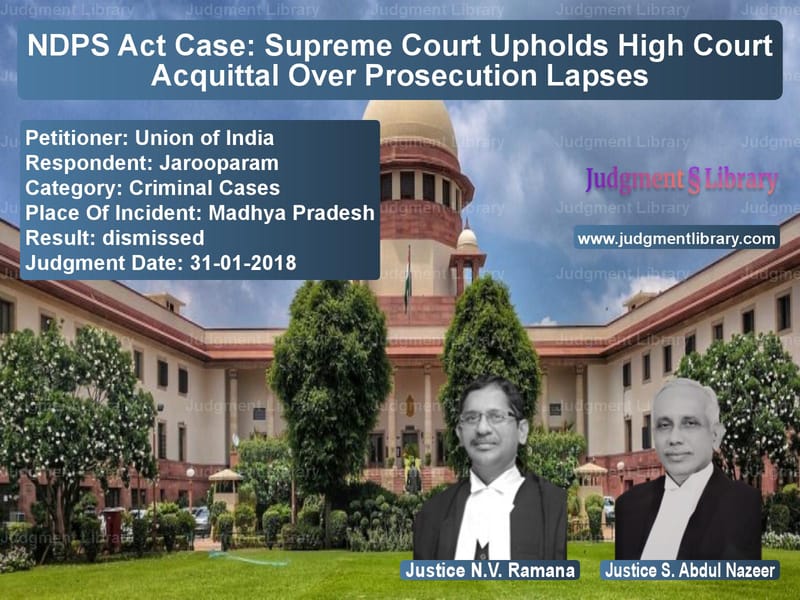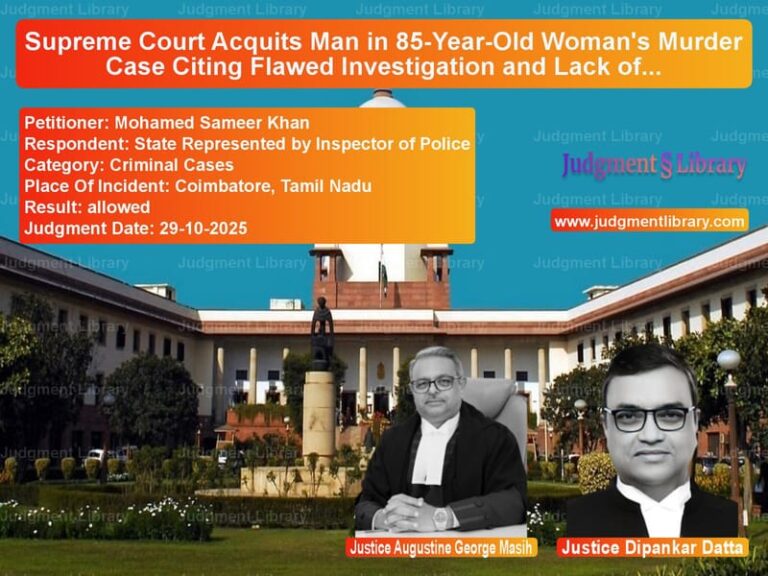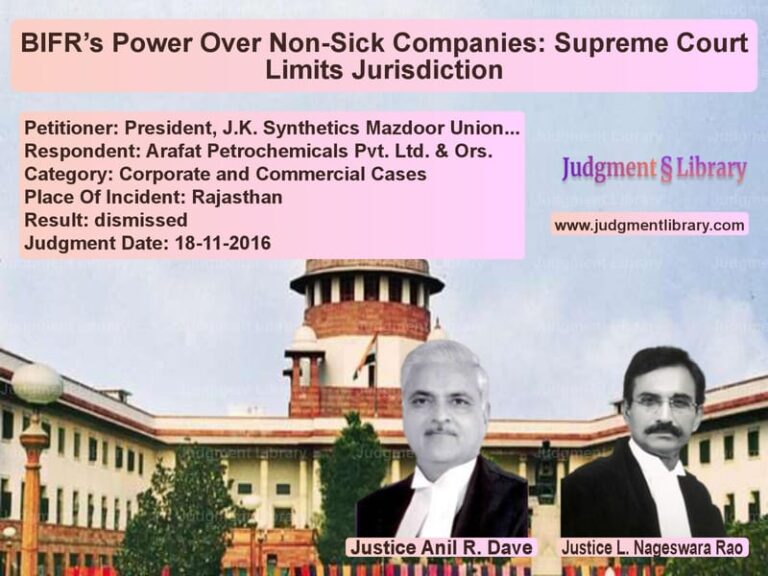NDPS Act Case: Supreme Court Upholds High Court Acquittal Over Prosecution Lapses
The case of Union of India vs. Jarooparam was a critical judgment under the Narcotic Drugs and Psychotropic Substances Act, 1985 (NDPS Act). This case revolved around the seizure of 7.2 kg of opium, procedural lapses in handling evidence, and the admissibility of confessions recorded under Section 67 of the NDPS Act. The Supreme Court, in its judgment dated January 31, 2018, upheld the acquittal of the accused, Jarooparam, ruling that the prosecution had failed to establish its case beyond a reasonable doubt.
The judgment highlights crucial aspects of criminal procedure, including the importance of preserving seized contraband, the role of independent witnesses, and the necessity of voluntary confessions in drug-related cases. The Supreme Court’s ruling reiterates the strict compliance required under the NDPS Act for securing convictions.
Background of the Case
The case originated from an intelligence report received on May 11, 2004, indicating that the accused, Jarooparam, was in possession of contraband. Acting on this information, Inspector P.K. Sinha (PW7) laid a trap and intercepted Jarooparam and two other accused at Bhilkhanda Square. During the search, authorities recovered 7.2 kg of opium from Jarooparam.
Following the seizure, two samples of 30 grams each were taken and marked as ‘A1’ and ‘A2’. The remaining bulk of the contraband was sealed and marked as ‘A’. Jarooparam confessed to possessing the contraband, and a report was submitted to the Superintendent, who appointed Harvindar Singh (PW6) as the investigating officer. The seized material was sent for chemical examination, and a complaint was filed under Sections 8/18 and 29 of the NDPS Act.
Trial Court Conviction
The Special Judge, Neemuch, convicted Jarooparam on April 21, 2008, under Sections 8/18 and 29 of the NDPS Act. The trial court sentenced him to 10 years of rigorous imprisonment and imposed a fine of Rs. 1,00,000. The conviction was based on:
- The seizure of 7.2 kg of opium.
- His confession recorded under Section 67 of the NDPS Act.
- Testimonies of the investigating officer and other prosecution witnesses.
Aggrieved by the conviction, Jarooparam appealed to the High Court of Madhya Pradesh.
High Court Acquittal
The High Court, in its judgment dated February 23, 2010, set aside the conviction, citing several deficiencies in the prosecution’s case:
- The bulk quantity of the seized contraband was not properly disposed of by the Executive Magistrate.
- The accused’s confession was recorded while he was in police custody, making it involuntary.
- His signature was allegedly obtained on blank papers, raising questions about the authenticity of the confession.
- Key prosecution witnesses turned hostile.
As a result, the High Court acquitted Jarooparam of all charges. The Union of India then appealed to the Supreme Court, challenging the High Court’s acquittal.
Supreme Court’s Analysis and Judgment
The Supreme Court, while dismissing the appeal, scrutinized the following issues:
1. Procedural Lapses in Handling Seized Contraband
“After taking out two samples of 30 grams each, the Executive Magistrate returned the entire remaining seized property to the Investigating Officer—PW6.”
The Court observed that the prosecution failed to follow the proper procedure under Section 52A of the NDPS Act, which mandates that seized narcotics must be disposed of under judicial supervision. In this case, the bulk contraband was not accounted for, casting doubt on whether the samples were genuinely drawn from the seized material.
2. Confession Under Section 67 of the NDPS Act
“The statement of the accused was recorded while he was in custody, and no time was mentioned on the statement.”
The Court ruled that confessions made under Section 67 of the NDPS Act while in police custody cannot be relied upon unless proven to be voluntary. Given that the accused claimed coercion, and there was no independent corroboration, the Court deemed the confession inadmissible.
3. Lack of Independent Witnesses
“PWs 1 and 2, the independent witnesses portrayed by the prosecution, turned hostile and did not support its case.”
The Supreme Court noted that the prosecution relied heavily on the testimonies of officials involved in the seizure but failed to present independent witnesses to corroborate their claims. This raised serious concerns about the integrity of the investigation.
4. Burden of Proof on the Prosecution
“Omission on the part of the prosecution to produce the bulk quantity of seized opium would create doubt in the mind of the Court on the genuineness of the samples.”
The Court reaffirmed that in NDPS cases, the prosecution must prove its case beyond reasonable doubt. The failure to explain the disposal of the bulk contraband and the absence of credible witnesses significantly weakened the case against the accused.
Conclusion
Based on these findings, the Supreme Court upheld the High Court’s judgment, ruling that the prosecution had failed to establish its case with proper evidence. The appeal was dismissed, and the acquittal of Jarooparam was confirmed.
This judgment serves as a crucial reminder that procedural safeguards under the NDPS Act must be strictly adhered to. Failure to follow due process can lead to the collapse of even seemingly strong cases.
Don’t miss out on the full details! Download the complete judgment in PDF format below and gain valuable insights instantly!
Download Judgment: Union of India vs Jarooparam Supreme Court of India Judgment Dated 31-01-2018.pdf
Direct Downlaod Judgment: Direct downlaod this Judgment
See all petitions in Drug Possession Cases
See all petitions in Bail and Anticipatory Bail
See all petitions in Fraud and Forgery
See all petitions in Judgment by N.V. Ramana
See all petitions in Judgment by S. Abdul Nazeer
See all petitions in dismissed
See all petitions in supreme court of India judgments January 2018
See all petitions in 2018 judgments
See all posts in Criminal Cases Category
See all allowed petitions in Criminal Cases Category
See all Dismissed petitions in Criminal Cases Category
See all partially allowed petitions in Criminal Cases Category







